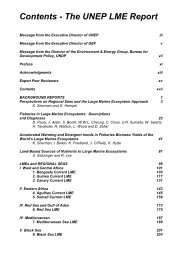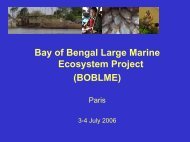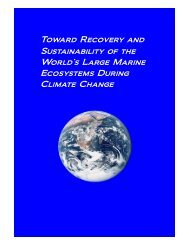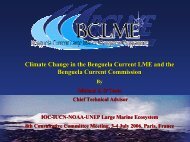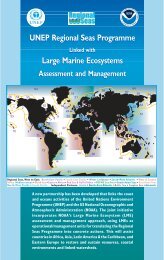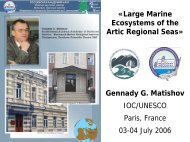Sustaining the World's Large Marine Ecosystems
Sustaining the World's Large Marine Ecosystems
Sustaining the World's Large Marine Ecosystems
Create successful ePaper yourself
Turn your PDF publications into a flip-book with our unique Google optimized e-Paper software.
Future Needs of <strong>the</strong><br />
LME Approach Worldwide<br />
Gotthilf Hempel<br />
Kiel, Germany<br />
For <strong>the</strong> conservation of nature and natural resources in <strong>the</strong> World’s oceans and<br />
in coastal waters, some approaches target individual species or groups of<br />
species, o<strong>the</strong>rs aim to protect certain habitats and <strong>the</strong>ir biodiversity. The holistic<br />
concept of <strong>Large</strong> <strong>Marine</strong> <strong>Ecosystems</strong> goes one step fur<strong>the</strong>r by encompassing<br />
large areas reaching from <strong>the</strong> sea shore into <strong>the</strong> open sea above <strong>the</strong> shelf and<br />
continental slope. In <strong>the</strong> course of three decades, <strong>the</strong> LME concept of an<br />
ecosystem-based approach to resource management has been adopted<br />
worldwide. The LME criteria, modules and indicators have shown to be<br />
sufficiently robust and flexible to be applicable in all climate zones and in regions<br />
differing greatly in <strong>the</strong>ir socio-economic and political condition.<br />
The LME concept became <strong>the</strong> framework for national and international<br />
programmes of LME wide research and monitoring and for <strong>the</strong> development of<br />
management strategies and governance. In <strong>the</strong> United States, <strong>the</strong> Nor<strong>the</strong>ast<br />
Shelf was <strong>the</strong> starting point for <strong>the</strong> development of LME oriented projects. The<br />
LME approach has been followed in o<strong>the</strong>r parts of <strong>the</strong> world, particularly in<br />
developing countries eligible for funding by <strong>the</strong> Global Environment Facility<br />
(GEF). There are presently 16 GEF-funded LME projects, in Africa, Asia, Latin<br />
America, <strong>the</strong> Caribbean and eastern Europe (Sherman et al., this publication).<br />
The LME programmes serve various stakeholder groups: for <strong>the</strong> environmentalists,<br />
LME projects are striving towards <strong>the</strong> recovery of depleted fish stocks,<br />
restoration of degraded habitats, reduction of nutrient enrichment, coping with <strong>the</strong><br />
invasion of alien species, conservation of biodiversity, and adaptation to climate<br />
change. For society, LME projects strive for <strong>the</strong> sustainable development of<br />
marine resources and services for growing populations of coastal communities,<br />
coastal states and <strong>the</strong> global market. <strong>Marine</strong> scientists – both pure and applied –<br />
learn much about complex biological interaction in <strong>the</strong> ecosystem and <strong>the</strong><br />
different roles of natural driving forces and of man in altering <strong>the</strong> system in <strong>the</strong><br />
past and at present.<br />
My relations to <strong>the</strong> LME movement date back to its very early days in <strong>the</strong> 1970´s<br />
and I returned to it in <strong>the</strong> 1990´s when Angola, Namibia and South Africa with <strong>the</strong><br />
111



